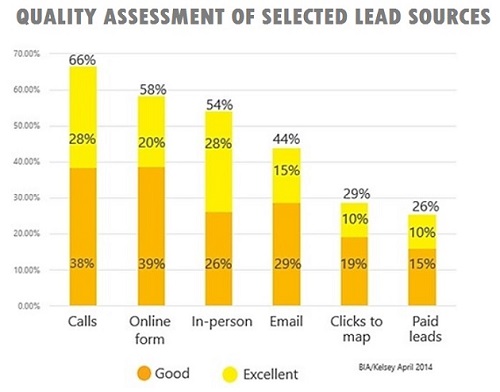It's impossible to read anything about marketing today without running into one big word: Mobile.
But here's something you might not have heard yet: Mobile marketing is practically made for small and medium-sized businesses (SMBs), for two primary reasons:
1. Most mobile searches are for local businesses. Local businesses tend to be SMBs, which means that most mobile searchers are looking for you.
2. Search marketing, whether mobile or otherwise, is the easiest marketing to control. Set your budget where you're comfortable, start and stop with the click of a button. Can marketing get more appealing? Only if free ice cream is involved.
So let's talk about how you can get mighty with mobile, and zero in on your audience.
Based in part on the elements included in a whitepaper about mobile strategy (PDF) created jointly with Larry Kim, founder and partner at WordStream, the article will discuss how to...
-
Wrap you head around the realities of mobile
- Understand user context in mobile search
- Get started with your mobile search marketing campaign
Wrapping your head around the realities of mobile
We're starting here because we know your secret: Most small and medium-sized businesses do not have a mobile-optimized website. Only 6% of SMBs have a mobile site, according to a 2014 study by Hibu. Six percent! It's almost like you think this mobile thing is a silly trend that's going to pass (like Gangnam Style).
But it's not going to pass. It's going to get bigger. And the sooner you step up, the easier it will be for you to leap ahead of your SMB competition.
Before you go and get all overwhelmed with the details of website design, check out some of these services that help convert your site to a mobile-friendly interface:
Here are a few other reasons you need to wrap your head around the realities of mobile:
- Half of the entire population of the US is checking their smartphones up to 150 times a day. (ExactTarget 2014 Mobile Behavior Support)
- Consumers choose search as their No. 1 in-store resource for helping them make purchase decisions. (ThriveAnalytics, April 2014)
- 78% of local-mobile searches result in offline purchases in a business. (comScore, Neustar Localeze, 15 miles, Local Search Study, April 2014)
Understanding user context in mobile search
Getting to the bottom of "user context" is getting to the bottom of the holy grail in search marketing: "user intent"—i.e., what is the searcher trying to do?
In a mobile situation, you can make some safe assumptions about the context of the persons doing a search: They're in immediate need, they possibly want to know what's near them, and they possibly want directions to get there. Or, they're standing in a store doing some comparison-shopping.
Someone searching on a mobile isn't likely to be at home or in the office sitting at a desk. They're already engaged with the world around them. Which means they're primed for action: 70% of mobile conversions happen within five hours of mobile search. (Microsoft/Bing internal data 2014)
Think about the guy who searches for a locksmith on his mobile at 1 AM. User context: locked out of his house. But the guy who searched for a locksmith on a desktop computer at 2 PM isn't as likely to be in urgent need; he could be getting estimates for changing the locks on the front door.
How do we use our understanding of user context to reach customers? By getting sharp with the tools of mobile marketing. (See below.)
Getting started with mobile search marketing
If you're already running search advertising campaigns on Bing Ads or Google AdWords, adding some mobile-focused campaigns will be simple. If you're not already using search advertising, visit Bing Ads and Google AdWords to set up an account.
After you've got that piece nailed down, drill into these specifics for the strongest mobile campaigns:
-
Add click-to-call or call extensions to your ads, which allow searchers to tap their phone and call you; research shows that these calls have a much higher value than any other online mobile conversion.

-
Add map extensions and location extensions. Most mobile searches are local, and intent is often directional ("gas station" or "sushi restaurant"). Letting your searchers find you with a simple map tap gets them to your business quickly and easily.
- Zero in on geographic targeting so that only searchers in a specific area see your ads—saving you money and narrowing your target market.
- Try time-of-day-based bidding. A coffee shop might not want to show up for searches happening after 5 PM.
- Take a close look at your bid strategy and get aggressive with your money where it makes the most sense. A store selling rain boots might bid highest for searches happening in the winter months.
- Work with your ad copy until it's delivering the right customer based on your offering. Take into consideration your searcher's intent. For example, that locksmith who is targeting by time-of-day might run an ad with this title: "Locked out of your house? We can help!"
Now go be mighty
As professional marketers, we find it difficult to see so many SMBs ignoring the mighty mobile movement. It's like a parent watching a child refuse vegetables. It's good for you! You're going to love it! You'll feel so much better if you just give this a try!
So go on... Join the movement.




